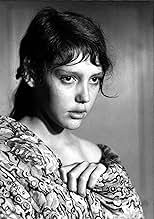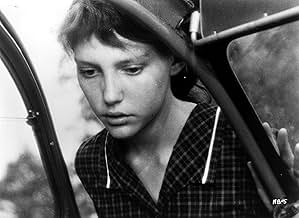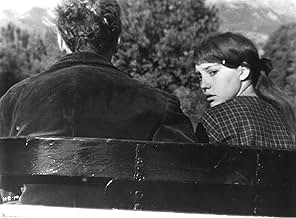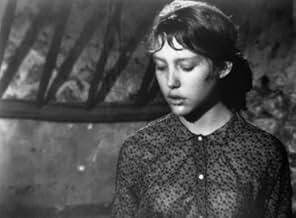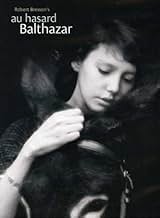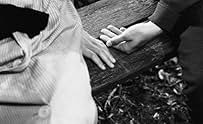CALIFICACIÓN DE IMDb
7.7/10
24 k
TU CALIFICACIÓN
La historia de un burro maltratado y la gente de su entorno.La historia de un burro maltratado y la gente de su entorno.La historia de un burro maltratado y la gente de su entorno.
- Premios
- 7 premios ganados y 2 nominaciones en total
Mylène Van der Mersch
- Nurse
- (as Mylène Weyergans)
- Dirección
- Guionista
- Todo el elenco y el equipo
- Producción, taquilla y más en IMDbPro
Opiniones destacadas
The film's ending is one of the most memorable in cinema, and achieves an eerie grace, consistent with its almost unique tone - allusively Biblical and allegorical, yet resistant to specific meanings and interpretations. The plot is a narrative of human cruelty and escalating despair, but always with enough mystery in the motivation to ward off easy condemnations; and perhaps even to indicate divine guidance. Throughout, Wiazemsky seizes on the donkey as a symbol of transcendence(her mother calls it a saint in the end); it's formally christened at the beginning and undergoes something approaching a formal funeral, all of which gives its life the contours of a spiritual journey of discovery. The narrative encompasses both revelations (the interlude in the fair; new tortures like the mean old man who starves and beats him) and retrenchment; both life's austerity, its roots in servitude, and its enormous potential dignity. Never was a donkey filmed so evocatively - but as always with Bresson, the simplicity is thrilling too - there's no false artistry here; no dubious anthropomorphism. A necessary film, and I'm amazed that I'm the first one to be commenting on it here.
This is a very important film. It makes you look into yourself and examine your own worth.
The world is not a fair place to live in. It has its own social structures and with each their is a certain perception of worth. Robert Bresson displays these perceptions from the bottom up.
Much like Vittorio DeSica's Umberto D, this film intertwines the relationship between man and beast. But who is the beast? It's society.
With images shot in crisp black and white Robert Bresson reveals the sordidness of the human soul, how cruel, selfish, pathetic, and unjust it can be. Au Hasard Balthazar is not an easy film to watch, but its honesty and approach towards society's injustices make it a must see.
The world is not a fair place to live in. It has its own social structures and with each their is a certain perception of worth. Robert Bresson displays these perceptions from the bottom up.
Much like Vittorio DeSica's Umberto D, this film intertwines the relationship between man and beast. But who is the beast? It's society.
With images shot in crisp black and white Robert Bresson reveals the sordidness of the human soul, how cruel, selfish, pathetic, and unjust it can be. Au Hasard Balthazar is not an easy film to watch, but its honesty and approach towards society's injustices make it a must see.
Maybe I'm not as completely overwhelmed with the work of the immensely revered director Robert Bresson as others are, and I almost wish I was more so. I do know from the other films I have seen of his- Pickpocket and A Man Escaped- that he is one of the superior craftsmen of his time in France, a veritable storyteller with a very precise, original craftsmanship and way about telling his stories that shows compromise is nowhere in sight. However I don't think, try as I might (and I do love other films that do evoke religious connotations and metaphors like with Dreyer and Rossellini's films, which perhaps aren't as heavy-handed), to soak into all of the allegory of it all.
When it comes down to it, Au hasard Balthazar is a kind of fable, and it is successful even as some of the Christian connections are lost on me. It is strongest at being a dramatic look at two lives where drama doesn't need to be put to highest heights or given a shot of adrenaline. There's almost something very worn down about the characters- as well as the donkey Balthazar- that is the best part of what Bresson does try to draw parallels to. His direction might be un-easy to get along with, but it is rewarding in a cathartic way too.
Much has been written about Balthazar being a kind of saintly figure, or Jesus, who suffers all of his life and then at the end dies a sorrowful death for, perhaps, everyone else's sins. But if that side of reading into it isn't really suiting, and you're looking for just a really well-told story (which is really all a fable can do), the donkey's- and Marie's (Anne Wiazemesky) story does take on a neo-realist side to it too. It's the everyday things that count in this world, and act as burdens that don't give people the kind of life and enjoyment they could have.
While Bresson maybe doesn't have his great strengths in much of the dialog, his direction of the actors, which involved multiple takes to the point of (as with the donkey) beating the life out of it, is quite unique. Like with Pickpocket, you can tell something is so suppressed with them, even with the careless young man who Marie falls in love with- and later leaves- and the unfortunate drunk who 'takes care of Balthazar for a while, that it's no wonder nothing happy ever really comes to any of them. Also, the body language is so distinct and powerful that it really makes the uncomplicated nature of the photography and editing work that much more so. Turn the sound off and it might not even make a difference (what with lack of music)
Two of my favorite scenes might likely be two of the best scenes I've ever seen from the few Bresson films I've seen. One is when Balthazar has a brief stint in a circus, and it's interesting to see how the simplistic nature of the story reaches, for once, an almost ironically amusing point in this scene. For a moment you're pulled into that illusion of a Disney movie- where an animal is meant to be more like us, but then once reality comes back in it wipes that all away. The other scene is during a dance in a bar, where everyone's bopping away to a jazz song, and the young man mentioned before, throws bottles and causes a ruckus, but no one seems to stop dancing at all.
Are they too, who should be having a good time, that numbed by their lives to not be shook up by the disturbances around them? It is a film that really does get you thinking once it ends, about how small-town society treats things in very set ways that make some like Marie want to just get out. There's an undercurrent in the story of money being an integral- and hurtful- part of the world, where pride and suffering gets mixed up in it too. But most striking when watching the film are the scenes with the donkey, who punctuates the un-wavering methods of those around him (who very rarely are actually kind and happy around him, aside from the kids early on). These scenes display Bresson utilizing his storytelling and skills with poignancy that, if you can identify with the innocent(s) of the story, is kind of mind-blowing.
Even if the film is possibly imperfect, it nevertheless left me feeling I had seen something special. Few filmmakers can get away today with putting together a tragic story and pulling parallels between a worker animal and a misguided young woman and how others out there try to live every day. It's a brave movie more often than not that might hit (and has hit) other viewers both young and old alike. Grade: A
When it comes down to it, Au hasard Balthazar is a kind of fable, and it is successful even as some of the Christian connections are lost on me. It is strongest at being a dramatic look at two lives where drama doesn't need to be put to highest heights or given a shot of adrenaline. There's almost something very worn down about the characters- as well as the donkey Balthazar- that is the best part of what Bresson does try to draw parallels to. His direction might be un-easy to get along with, but it is rewarding in a cathartic way too.
Much has been written about Balthazar being a kind of saintly figure, or Jesus, who suffers all of his life and then at the end dies a sorrowful death for, perhaps, everyone else's sins. But if that side of reading into it isn't really suiting, and you're looking for just a really well-told story (which is really all a fable can do), the donkey's- and Marie's (Anne Wiazemesky) story does take on a neo-realist side to it too. It's the everyday things that count in this world, and act as burdens that don't give people the kind of life and enjoyment they could have.
While Bresson maybe doesn't have his great strengths in much of the dialog, his direction of the actors, which involved multiple takes to the point of (as with the donkey) beating the life out of it, is quite unique. Like with Pickpocket, you can tell something is so suppressed with them, even with the careless young man who Marie falls in love with- and later leaves- and the unfortunate drunk who 'takes care of Balthazar for a while, that it's no wonder nothing happy ever really comes to any of them. Also, the body language is so distinct and powerful that it really makes the uncomplicated nature of the photography and editing work that much more so. Turn the sound off and it might not even make a difference (what with lack of music)
Two of my favorite scenes might likely be two of the best scenes I've ever seen from the few Bresson films I've seen. One is when Balthazar has a brief stint in a circus, and it's interesting to see how the simplistic nature of the story reaches, for once, an almost ironically amusing point in this scene. For a moment you're pulled into that illusion of a Disney movie- where an animal is meant to be more like us, but then once reality comes back in it wipes that all away. The other scene is during a dance in a bar, where everyone's bopping away to a jazz song, and the young man mentioned before, throws bottles and causes a ruckus, but no one seems to stop dancing at all.
Are they too, who should be having a good time, that numbed by their lives to not be shook up by the disturbances around them? It is a film that really does get you thinking once it ends, about how small-town society treats things in very set ways that make some like Marie want to just get out. There's an undercurrent in the story of money being an integral- and hurtful- part of the world, where pride and suffering gets mixed up in it too. But most striking when watching the film are the scenes with the donkey, who punctuates the un-wavering methods of those around him (who very rarely are actually kind and happy around him, aside from the kids early on). These scenes display Bresson utilizing his storytelling and skills with poignancy that, if you can identify with the innocent(s) of the story, is kind of mind-blowing.
Even if the film is possibly imperfect, it nevertheless left me feeling I had seen something special. Few filmmakers can get away today with putting together a tragic story and pulling parallels between a worker animal and a misguided young woman and how others out there try to live every day. It's a brave movie more often than not that might hit (and has hit) other viewers both young and old alike. Grade: A
To read through most reviews of Balthazar feels like having stepped inside a church with people sighing about god and transcendence, which is a testament to Bresson's power here in his most spiritual work so far. But let me step outside in clear air for a moment.
It was an ongoing project for him, striving for an ascetic eye that purifies. He had began (essentially) with Diary of a Priest, ambitious work about a spiritual journey. But I believe he was troubled by a few things in it, if his next films offer any clue.
He spent the next couple of films completely muting the emotional turmoil evident in Diary, taking all the romanticism out, making them purely about the desire to break free from a prison-world. Pickpocket and Jeanne D'Arc were sketches in that austere direction. But this was setting him down a disastrous path where the only thing purer was was just more and more bare. When does fasting become starving and why is a stone floor purer than a furnished house?
How about we say that his desire to evoke the abstract was laudable, but his dogmatic way of doing it absolutely killed the world in which it lives and hides? His camera murders it. It only managed to take the pure out of life and make a liturgy around its dead body. It was destroying the possibility for cinematic space to support metaphor, inner life, poetry, and to simply be anything other than dead nature. The process of facts alone won't do, they can never convey life, much less pure life.
So I had my sights set on Balthazar as his most pure, most lauded, and expected perhaps to mount a critique of a spirituality that is only its own funeral. But I believe he beat me to the punch. I believe he began to see that he was starving himself, at least so far as the film is different from before.
This is his most lush, his most ambitious since Diary (none of the interim were), his most accomplished and with the most life. His camera doesn't just stare, it moves again and searches. He doesn't just create ellipsis within a scene, he makes it move across the narrative.
A household collapses, but we move to see this in the girl's disastrous relationship with a despicable bully, and we experience the loss of innocence, the fouling of kindness in her world, in Balthazar's treatment at the hands of several callous owners.
At the center Bresson has the most placid, most unassuming actor, a selfless being. It's by reading what we do in Balthazar's eyes that we color the whole and it ripples through and becomes ours. We have the reactions he doesn't and thus humanize ourselves. It's marvelous and it plumbs into something fundamental about how the world is put together that makes it worthy beyond technique.
See, life will break down, sometimes for no other reason than someone changed his mind about a deal and pride. It will break and scatter in pieces, go through the cycle of suffering. The film ends with everything broken, nothing put back together, the girl having left off for a next life somewhere.
What it plumbs is that what we see into these makes a difference. There's abandonment at the end, heartbreak, anonymous loss of a soul that we knew as dear. But I would rather see courage myself. Instead of projecting our human terror into him, take from his capacity to endure. If suffering isn't pain, it's not being able to abide pain; how about there is nothing lost, nothing broken, there is only a time for things to come together and a time to disperse again? Balthazar isn't lost, he has returned, or so it goes maybe.
It was an ongoing project for him, striving for an ascetic eye that purifies. He had began (essentially) with Diary of a Priest, ambitious work about a spiritual journey. But I believe he was troubled by a few things in it, if his next films offer any clue.
He spent the next couple of films completely muting the emotional turmoil evident in Diary, taking all the romanticism out, making them purely about the desire to break free from a prison-world. Pickpocket and Jeanne D'Arc were sketches in that austere direction. But this was setting him down a disastrous path where the only thing purer was was just more and more bare. When does fasting become starving and why is a stone floor purer than a furnished house?
How about we say that his desire to evoke the abstract was laudable, but his dogmatic way of doing it absolutely killed the world in which it lives and hides? His camera murders it. It only managed to take the pure out of life and make a liturgy around its dead body. It was destroying the possibility for cinematic space to support metaphor, inner life, poetry, and to simply be anything other than dead nature. The process of facts alone won't do, they can never convey life, much less pure life.
So I had my sights set on Balthazar as his most pure, most lauded, and expected perhaps to mount a critique of a spirituality that is only its own funeral. But I believe he beat me to the punch. I believe he began to see that he was starving himself, at least so far as the film is different from before.
This is his most lush, his most ambitious since Diary (none of the interim were), his most accomplished and with the most life. His camera doesn't just stare, it moves again and searches. He doesn't just create ellipsis within a scene, he makes it move across the narrative.
A household collapses, but we move to see this in the girl's disastrous relationship with a despicable bully, and we experience the loss of innocence, the fouling of kindness in her world, in Balthazar's treatment at the hands of several callous owners.
At the center Bresson has the most placid, most unassuming actor, a selfless being. It's by reading what we do in Balthazar's eyes that we color the whole and it ripples through and becomes ours. We have the reactions he doesn't and thus humanize ourselves. It's marvelous and it plumbs into something fundamental about how the world is put together that makes it worthy beyond technique.
See, life will break down, sometimes for no other reason than someone changed his mind about a deal and pride. It will break and scatter in pieces, go through the cycle of suffering. The film ends with everything broken, nothing put back together, the girl having left off for a next life somewhere.
What it plumbs is that what we see into these makes a difference. There's abandonment at the end, heartbreak, anonymous loss of a soul that we knew as dear. But I would rather see courage myself. Instead of projecting our human terror into him, take from his capacity to endure. If suffering isn't pain, it's not being able to abide pain; how about there is nothing lost, nothing broken, there is only a time for things to come together and a time to disperse again? Balthazar isn't lost, he has returned, or so it goes maybe.
Born into a world of despair, pain and fear, with a back to carry allsorts on and two eyes to fill with tears, abused and often put upon, never knowing where things might have gone, but conforming to the stick and whip, while no one hears your prayers.
Poor old Balthazar doesn't know which way to turn, on occasions folks are kind and free, at other times they let him burn, but why are they so changeable, what makes these people tick, is it natural that their spirit is to hurt, with pain inflict.
The hazards of being a young woman growing up in rural France and the challenges of a donkey with the same backdrop, both brilliantly performed by the donkey and Anne Wiazemsky, who leave you under no illusion of the suffering they have to endure.
Poor old Balthazar doesn't know which way to turn, on occasions folks are kind and free, at other times they let him burn, but why are they so changeable, what makes these people tick, is it natural that their spirit is to hurt, with pain inflict.
The hazards of being a young woman growing up in rural France and the challenges of a donkey with the same backdrop, both brilliantly performed by the donkey and Anne Wiazemsky, who leave you under no illusion of the suffering they have to endure.
¿Sabías que…?
- TriviaBalthazar was an untrained donkey during most of the filming, which made Robert Bresson's work a real challenge. The only scene for which the donkey was trained was the circus math trick.
- ErroresIn the very last shot of the film the shadow of the camera man or someone else enters the picture from the bottom right.
- Citas
Gerard: Lend him to us.
Marie's mother: He's worked enough. He's old. He's all I have.
Gerard: Just for a day.
Marie's mother: Besides, he's a saint.
- Versiones alternativasRestored in 2014 from the original 35mm negative by the Éclair Group and L.E. Diapason.
- ConexionesEdited into Histoire(s) du cinéma: Seul le cinéma (1994)
- Bandas sonorasPiano Sonata No.20 in A Major, II. Andantino (D. 959)
Music by Franz Schubert
Performed by Jean-Joël Barbier
Selecciones populares
Inicia sesión para calificar y agrega a la lista de videos para obtener recomendaciones personalizadas
- How long is Au hasard Balthazar?Con tecnología de Alexa
Detalles
Taquilla
- Total en EE. UU. y Canadá
- USD 45,406
- Fin de semana de estreno en EE. UU. y Canadá
- USD 8,436
- 19 oct 2003
- Total a nivel mundial
- USD 45,406
- Tiempo de ejecución1 hora 35 minutos
- Color
- Mezcla de sonido
- Relación de aspecto
- 1.66 : 1
Contribuir a esta página
Sugiere una edición o agrega el contenido que falta

Principales brechas de datos
What is the Japanese language plot outline for Al azar, Baltasar (1966)?
Responda

